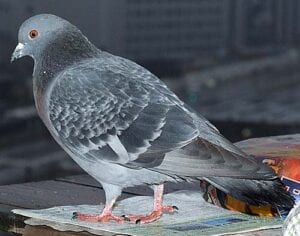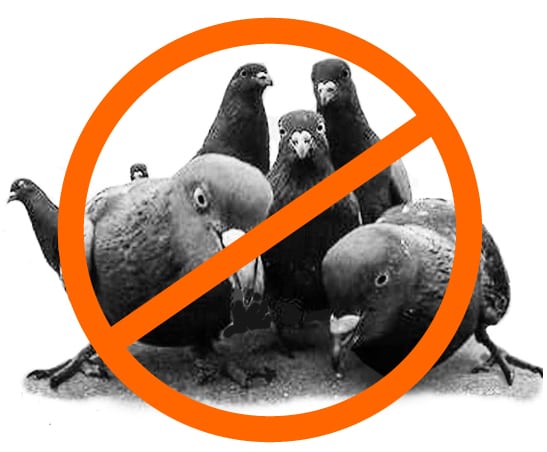
by Pigeon Patrol | Jun 7, 2021 | Animal Deterrent Products, Bird Deterrent Products, Bird Law, Bird Netting, Bird Spikes
“Men still live who, in their youth, remember pigeons; trees still live who, in their youth, were shaken by a living wind. But a few decades hence only the oldest oaks will remember, and at long last only the hills will know.”
—Aldo Leopold, “On a Monument to the Pigeon,” 1947
In May 1850, a 20-year-old Potawatomi tribal leader named Simon Pokagon was camping at the headwaters of Michigan’s Manistee River during trapping season when a far-off gurgling sound startled him. It seemed as if “an army of horses laden with sleigh bells was advancing through the deep forests towards me,” he later wrote. “As I listened more intently, I concluded that instead of the tramping of horses it was distant thunder; and yet the morning was clear, calm, and beautiful.” The mysterious sound came “nearer and nearer,” until Pokagon deduced its source: “While I gazed in wonder and astonishment, I beheld moving toward me in an unbroken front millions of pigeons, the first I had seen that season.”
These were passenger pigeons, Ectopistes migratorius, at the time the most abundant bird in North America and possibly the world. Throughout the 19th century, witnesses had described similar sightings of pigeon migrations: how they took hours to pass over a single spot, darkening the firmament and rendering normal conversation inaudible. Pokagon remembered how sometimes a traveling flock, arriving at a deep valley, would “pour its living mass” hundreds of feet into a downward plunge. “I have stood by the grandest waterfall of America,” he wrote, “yet never have my astonishment, wonder, and admiration been so stirred as when I have witnessed these birds drop from their course like meteors from heaven.”
Pokagon recorded these memories in 1895, more than four decades after his Manistee River observation. By then he was in the final years of his life. Passenger pigeons, too, were in their final years. In 1871 their great communal nesting sites had covered 850 square miles of Wisconsin’s sandy oak barrens—136 million breeding adults, naturalist A.W. Schorger later estimated. After that the population plummeted until, by the mid-1890s, wild flock sizes numbered in the dozens rather than the hundreds of millions (or even billions). Then they disappeared altogether, except for three captive breeding flocks spread across the Midwest. About September 1, 1914, the last known passenger pigeon, a female named Martha, died at the Cincinnati Zoo. She was roughly 29 years old, with a palsy that made her tremble. Not once in her life had she laid a fertile egg.
This year marks the 100th anniversary of the passenger pigeon’s extinction. In the intervening years, researchers have agreed that the bird was hunted out of existence, victimized by the fallacy that no amount of exploitation could endanger a creature so abundant. Between now and the end of the year, bird groups and museums will commemorate the centenary in a series of conferences, lectures, and exhibits. Most prominent among them is Project Passenger Pigeon, a wide-ranging effort by a group of scientists, artists, museum curators, and other bird lovers. While their focus is on public education, an unrelated organization called Revive & Restore is attempting something far more ambitious and controversial: using genetics to bring the bird back.
Project Passenger Pigeon’s leaders hope that by sharing the pigeon’s story, they can impress upon adults and children alike our critical role in environmental conservation. “It’s surprising to me how many educated people I talk to who are completely unaware that the passenger pigeon even existed,” says ecologist David Blockstein, senior scientist at the National Council for Science and the Environment. “Using the centenary is a way to contemplate questions like, ‘How was it possible that this extinction happened?’ and ‘What does it say about contemporary issues like climate change?’ ”
They were evolutionary geniuses. Traveling in fast, gargantuan flocks throughout the eastern and midwestern United States and Canada—the males slate-blue with copper undersides and hints of purple, the females more muted—passenger pigeons would search out bumper crops of acorns and beechnuts. These they would devour, using their sheer numbers to ward off enemies, a strategy known as “predator satiation.” They would also outcompete other nut lovers—not only wild animals but also domestic pigs that had been set loose by farmers to forage.
In forest and city alike, an arriving flock was a spectacle—“a feathered tempest,” in the words of conservationist Aldo Leopold. One 1855 account from Columbus, Ohio, described a “growing cloud” that blotted out the sun as it advanced toward the city. “Children screamed and ran for home,” it said. “Women gathered their long skirts and hurried for the shelter of stores. Horses bolted. A few people mumbled frightened words about the approach of the millennium, and several dropped on their knees and prayed.” When the flock had passed over, two hours later, “the town looked ghostly in the now-bright sunlight that illuminated a world plated with pigeon ejecta.”
Nesting birds took over whole forests, forming what John James Audubon in 1831 called “solid masses as large as hogs-heads.” Observers reported trees crammed with dozens of nests apiece, collectively weighing so much that branches would snap off and trunks would topple. In 1871 some hunters coming upon the morning exodus of adult males were so overwhelmed by the sound and spectacle that some of them dropped their guns. “Imagine a thousand threshing machines running under full headway, accompanied by as many steamboats groaning off steam, with an equal quota of R.R. trains passing through covered bridges—imagine these massed into a single flock, and you possibly have a faint conception of the terrific roar,” the Commonwealth, a newspaper in Fond du Lac, Wisconsin, reported of that encounter.
The birds weren’t just noisy. They were tasty, too, and their arrival guaranteed an abundance of free protein. “You think about this especially with the spring flocks,” says Blockstein, the ecologist. “The people on the frontiers have survived the winter. They’ve been eating whatever food they’ve been able to preserve from the year before. Then, all of a sudden, here’s all this fresh meat flying by you. It must have been a time for great rejoicing: The pigeons are here!” (Not everyone shouted with joy. The birds also devoured crops, frustrating farmers and prompting Baron de Lahontan, a French soldier who explored North America during the 17th century, to write that “the Bishop has been forc’d to excommunicate ’em oftner than once, upon the account of the Damage they do to the Product of the Earth.”)
The flocks were so thick that hunting was easy—even waving a pole at the low-flying birds would kill some. Still, harvesting for subsistence didn’t threaten the species’ survival. But after the Civil War came two technological developments that set in motion the pigeon’s extinction: the national expansions of the telegraph and the railroad. They enabled a commercial pigeon industry to blossom, fueled by professional sportsmen who could learn quickly about new nestings and follow the flocks around the continent. “Hardly a train arrives that does not bring hunters or trappers,” reported Wisconsin’s Kilbourn City Mirror in 1871. “Hotels are full, coopers are busy making barrels, and men, women, and children are active in packing the birds or filling the barrels. They are shipped to all places on the railroad, and to Milwaukee, Chicago, St. Louis, Cincinnati, Philadelphia, New York, and Boston.”
The professionals and amateurs together outflocked their quarry with brute force. They shot the pigeons and trapped them with nets, torched their roosts, and asphyxiated them with burning sulfur. They attacked the birds with rakes, pitchforks, and potatoes. They poisoned them with whiskey-soaked corn. Learning of some of these methods, Potawatomi leader Pokagon despaired. “These outlaws to all moral sense would touch a lighted match to the bark of the tree at the base, when with a flash—more like an explosion—the blast would reach every limb of the tree,” he wrote of an 1880 massacre, describing how the scorched adults would flee and the squabs would “burst open upon hitting the ground.” Witnessing this, Pokagon wondered what type of divine punishment might be “awaiting our white neighbors who have so wantonly butchered and driven from our forests these wild pigeons, the most beautiful flowers of the animal creation of North America.”
Ultimately, the pigeons’ survival strategy—flying in huge predator-proof flocks—proved their undoing. “If you’re unfortunate enough to be a species that concentrates in time and space, you make yourself very, very vulnerable,” says Stanley Temple, a professor emeritus of conservation at the University of Wisconsin.
Passenger pigeons might have even survived the commercial slaughter if hunters weren’t also disrupting their nesting grounds—killing some adults, driving away others, and harvesting the squabs. “It was the double whammy,” says Temple. “It was the demographic nightmare of overkill and impaired reproduction. If you’re killing a species far faster than they can reproduce, the end is a mathematical certainty.” The last known hunting victim was “Buttons,” a female, which was shot in Pike County, Ohio, in 1900 and mounted by the sheriff ’s wife (who used two buttons in lieu of glass eyes). Almost seven decades later a man named Press Clay Southworth took responsibility for shooting Buttons, not knowing her species, when he was a boy.
Even as the pigeons’ numbers crashed, “there was virtually no effort to save them,” says Joel Greenberg, a research associate with Chicago’s Peggy Notebaert Nature Museum and the Field Museum. “People just slaughtered them more intensely. They killed them until the very end.”
Contemporary environmentalism arrived too late to prevent the passenger pigeon’s demise. But the two phenomena share a historical connection. “The extinction was part of the motivation for the birth of modern 20th century conservation,” says Temple. In 1900, even before Martha’s death in the Cincinnati Zoo, Republican Congressman John F. Lacey of Iowa introduced the nation’s first wildlife-protection law, which banned the interstate shipping of unlawfully killed game. “The wild pigeon, formerly in flocks of millions, has entirely disappeared from the face of the earth,” Lacey said on the House floor. “We have given an awful exhibition of slaughter and destruction, which may serve as a warning to all mankind. Let us now give an example of wise conservation of what remains of the gifts of nature.” That year Congress passed the Lacey Act, followed by the tougher Weeks-McLean Act in 1913 and, five years later, the Migratory Bird Treaty Act, which protected not just birds but also their eggs, nests, and feathers.
The passenger pigeon story continued to resonate throughout the century. In the 1960s populations of the dickcissel, a sparrow-like neotropical migrant, began crashing, and some ornithologists predicted its extinction by 2000. It took decades to uncover the reason: During winters, the entire world population of the grasslands bird converged into fewer than a dozen huge flocks, which settled into the llanos of Venezuela. There, rice farmers who considered the dickcissels a pest illegally crop-dusted their roosts with pesticides. “They were literally capable, in a matter of minutes, of wiping out double-digit percentages of the world’s population,” says Temple, who studied the bird. “The accounts are very reminiscent of the passenger pigeon.” As conservationists negotiated with rice growers during the 1990s—using research that showed the dickcissel was not an economic threat—they also invoked the passenger pigeon extinction to rally their colleagues in North America and Europe. The efforts paid off: The bird’s population has stabilized, albeit at a lower level.
Today the pigeon inspires artists and scientists alike. Sculptor Todd McGrain, creative director of the Lost Bird Project, has crafted enormous bronze memorials of five extinct birds; his passenger pigeon sits at the Grange Insurance Audubon Center in Columbus, Ohio. The Lost Bird Project has also designed an origami pigeon (like the one bound into this magazine) and says thousands have been folded—a symbolic recreation of the historic flocks.
The most controversial effort inspired by the extinction is a plan to bring the passenger pigeon back to life. In 2012 Long Now Foundation president Stewart Brand (a futurist best known for creating the Whole Earth Catalog) and genetics entrepreneur Ryan Phelan cofounded Revive & Restore, a project that plans to use the tools of molecular biology to resurrect extinct animals. The project’s “flagship” species is the passenger pigeon, which Brand learned about from his mother when he was growing up in Illinois. Revive & Restore hopes to start with the band-tailed pigeon, a close relative, and “change its genome into the closest thing to the genetic code of the passenger pigeon that we can make,” says research consultant Ben Novak. The resulting creature will not have descended from the original species. “[But] if I give it to a team of scientists who have no idea that it was bioengineered, and I say, ‘Classify this,’ if it looks and behaves like a passenger pigeon, the natural historians are going to say, ‘This is Ectopistes migratorius.’ And if the genome plops right next to all the other passenger pigeon genomes you’ve sequenced from history, then a geneticist will have to say, ‘This is a passenger pigeon. It’s not a band-tailed pigeon.’ ”
Revive & Restore plans to breed the birds in captivity before returning them to the wild in the 2030s. Novak says the initial research indicates that North American forests could support a reintroduced population. He hopes animals brought back from extinction—not just birds but eventually also big creatures like woolly mammoths—will draw the public to zoos in droves, generating revenues that can be used to protect wildlife. “De-extinction [can] get the public interested in conservation in a way that the last 40 years of doom and gloom has beaten out of them,” he says.
Other experts aren’t so sanguine. They question whether the hybrid animal could really be called a passenger pigeon. They doubt the birds could survive without the enormous flocks of the 19th century. And they question Novak’s belief that the forests could safely absorb the reintroduction. “The ecosystem has moved on,” says Temple. “If you put the organism back in, it could be disruptive to a new dynamic equilibrium. It’s not altogether clear that putting one of these extinct species from the distant past back into an ecosystem today would be much more than introducing an exotic species. It would have repercussions that we’re probably not fully capable of predicting.”
Blockstein says he wanted to use the 100th anniversary as a “teachable moment.” Which eventually led him to Greenberg, the Chicago researcher, who had been thinking independently about 2014’s potential. The two men reached out to others until more than 150 institutions were on board for a yearlong commemoration: museums, universities, conservation groups (including Audubon state offices and local chapters), libraries, arts organizations, government agencies, and nature and history centers.
Project Passenger Pigeon has since evolved to be a multimedia circus of sorts. Greenberg has published A Feathered River Across the Sky, a book-length account of the pigeon’s glory days and demise. Filmmaker David Mrazek plans to release a documentary called From Billions to None. At least four conferences will address the pigeon’s extinction, as will several exhibits. “We’re trying to take advantage of every possible mechanism to put the story in front of audiences that may not necessarily be birdwatchers, may not necessarily even be conservationists,” says Temple.
The commemoration goes beyond honoring one species. Telling the pigeon’s story can serve as a jumping-off point for exploring the many ways humans influence, and often jeopardize, their own environment. Today an estimated 13 percent of birds are threatened, according to the International Union for Conservation of Nature. So are 25 percent of mammals and 41 percent of amphibians, in large part because of human activity. Hydropower and road construction imperil China’s giant pandas. The northern bald ibis, once abundant in the Middle East, has been driven almost to extinction by hunting, habitat loss, and the difficulties of doing conservation work in war-torn Syria. Hunting and the destruction of wetlands for agriculture drove the population of North America’s tallest bird, the whooping crane, into the teens before stringent protections along the birds’ migratory route and wintering grounds helped the wild flock build back to a few hundred. Little brown bats are dying off in the United States and Canada from a fungus that might have been imported from Europe by travelers. Of some 300 species of freshwater mussels in North America, fully 70 percent are extinct, imperiled, or vulnerable, thanks to the impacts of water pollution from logging, dams, farm runoff, and shoreline development. Rising sea temperatures have disrupted the symbiotic relationship between corals and plant-like zooxanthellae, leading to a deadly phenomenon called coral bleaching. One-third of the world’s reef-building coral species are now threatened.

If public disinterest helped exterminate the passenger pigeon, then one modern-day parallel might be public skepticism about climate change. In an October poll by the Pew Research Center for the People and the Press, only 44 percent of Americans agreed there was solid evidence that the earth is warming because of human activity, as scientists now overwhelmingly believe. Twenty-six percent didn’t think there was significant proof of global warming at all. In another Pew poll, conducted last spring, 40 percent of Americans considered climate change a major national threat, compared with 65 percent of Latin Americans and slimmer majorities in Europe, Africa, and the Asia-Pacific region.
This denial of both the threat and our own responsibility sounds eerily familiar to those who study 19th century attitudes toward wildlife. “Certainly if you read some of the writings of the time,” says Blockstein, “there were very few people who put stock in the idea that humanity could have any impact on the passenger pigeons.” (Audubon himself dismissed those who believed that “such dreadful havoc” as hunting would “soon put an end to the species.”) Today attitudes toward climate change sound similar, continues Blockstein. “It’s the same kind of argument: ‘The world is so big and the atmosphere is so big; how could we possibly have an impact on the global climate?’”
Even the political rhetoric of those who don’t want to address climate change aggressively has 19th century echoes. “The industry that paid people to kill these birds said, ‘If you restrict the killing, people will lose their jobs,’ ” notes Greenberg—“the very same things you hear today.”
Project Passenger Pigeon might not change the minds of hardcore climate skeptics. For the rest of us, though, it could serve as a call to take responsibility for how our personal and collective actions affect wildlife and climate. Maybe a close look at the history of human folly will keep us from repeating it.
Source
Pigeon Patrol Products & Services is the leading manufacturer and distributor of bird deterrent (control) products in Canada. Pigeon Patrol products have solved pest bird problems in industrial, commercial, and residential settings since 2000, by using safe and humane bird deterrents with only bird and animal friendly solutions. At Pigeon Patrol, we manufacture and offer a variety of bird deterrents, ranging from Ultra-flex Bird Spikes with UV protection, Bird Netting, 4-S Bird Gel and the best Ultrasonic and audible sound devices on the market today.
Voted Best Canadian wholesaler for Bird Deterrent products ten years in a row.
Contact us at 1- 877– 4– NO-BIRD, (604) 585-9279 or visit our website at www.pigeonpatrol.ca
Pigeon/Pigeon Patrol / Pigeons Roosting / Vancouver Pigeon Control /Bird Spikes / Bird Control / Bird Deterrent / Pigeon Deterrent? Surrey Pigeon Control / Pest /Seagull deterrent / Vancouver Pigeon Blog / Birds Inside Home / Pigeons in the cities / Ice Pigeons/ What to do about pigeons/ sparrows , Damage by Sparrows, How To Keep Raccoons Away, Why Are Raccoons Considered Pests/ De-fence / Pigeon Nesting/ Bird Droppings / Pigeon Dropping/ woodpecker control/ Professional Bird Control Company/ Keep The Birds Away/ Birds/rats/ seagull/pigeon/woodpecker/ dove/sparrow/pidgeon control/pidgeon problem/ pidgeon control/flying rats/ pigeon Problems/ bird netting/bird gel/bird spray/bird nails/ bird guard
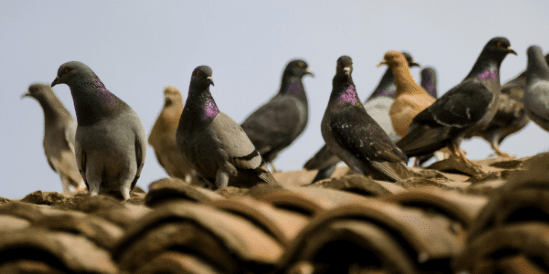
by Pigeon Patrol | May 31, 2021 | Animal Deterrent Products, Bird Deterrent Products, Bird Law, Bird Netting, Pigeon Patrol's Services, Pigeon Predators, Pigeon Spikes
A thick layer of bird droppings that have built up over the last decade from pigeons living in the broken Christ Church Cathedral will end up in landfill instead of being recycled into fertiliser.
Up to two tonnes of pigeon poo has accumulated since the devastating February 2011 earthquake.
Christ Church Cathedral Reinstatement project director Keith Paterson said the pigeons were “a bit of liability” and certainly not their “best friends”.
Few people have entered the building since the quake, but drones gave the reinstatement group an estimate of how much damage the pigeons had caused.
The project team aimed to reuse as much of the building material as possible.
Paterson estimated about half of the material would be reused to finish the reinstated cathedral, but much of the rubble inside would be too damaged.
Christchurch consultancy Soil Matters, which turns waste products from the dairy industry into fertiliser, was approached last year with the idea of potentially recycling the tonnes of pigeon droppings and broken limestone into something useful.

General manager Rik Mulder said his team came up with the idea last June to recycle nutrients including nitrogen, phosphorous and calcium containedin the pigeon droppings and limestone, once they had been tested and deemed safe.
The company had planned to crush the limestone and pigeon droppings to a fine powder and apply it to paddocks in local North Canterbury farms.
But the company learned it would need a resource consent for the crushing process, which the reinstatement group said would be too costly and take too long to obtain.
It led to the decision to dispose the material through “a more conventional solution”, using contractors to take it to landfill.
“I don’t rate the [environmental] sustainability any more highly than I do the cost or the heritage requirements,” Paterson said.
“They’re all just things that are there that we have to process and do in the most economical way.”
Mulder said he understood the reinstatement group had to make a call, but felt the lengthy process of obtaining a resource consent stopped innovative thinking.
“Shutting down” such projects did not encourage people to think sustainably and “outside the box”, he said.
“We are restrained in our efforts to try new things.”
Environment Canterbury (ECan) consent planning manager Aurora Grant said a consent was required because the pigeon droppings and limestone were classified as a contaminant.
Having a consent would allow ECan to understand the “effects of the activity and ensure the proposed activity is done in a way that has environmentally sustainable outcomes”.
Pathways existed to allow innovative and sustainable use of resources and not many were prohibited in the regional plans, she said.
The $153 million cathedral restoration is expected to be finished by mid-2027, earlier than initially proposed. The project, which began in late 2018, was initially expected to be completed in early 2028.
But on Thursday Stuff revealed the Anglicans’ ruling body may have to change its approval terms for the restoration to avoid work stopping in October if more funds cannot be found.
Workers are currently stabilising the cathedral to make it safe enough to work on.
The clean-up process will start with remote controlled machines going into the ruins to start removing bigger pieces of material, expected to start in October.
It will be another six to 12 months before anyone can go inside.
“We’re constantly reassessing how we’ll access the building from a safety perspective,” Paterson said.
By the end of the stabilisation stage, Paterson said the building would be about 34 per cent of the current seismic building code.
Source
Pigeon Patrol Products & Services is the leading manufacturer and distributor of bird deterrent (control) products in Canada. Pigeon Patrol products have solved pest bird problems in industrial, commercial, and residential settings since 2000, by using safe and humane bird deterrents with only bird and animal friendly solutions. At Pigeon Patrol, we manufacture and offer a variety of bird deterrents, ranging from Ultra-flex Bird Spikes with UV protection, Bird Netting, 4-S Bird Gel and the best Ultrasonic and audible sound devices on the market today.
Voted Best Canadian wholesaler for Bird Deterrent products ten years in a row.
Contact us at 1- 877– 4– NO-BIRD, (604) 585-9279 or visit our website at www.pigeonpatrol.ca
Pigeon/Pigeon Patrol / Pigeons Roosting / Vancouver Pigeon Control /Bird Spikes / Bird Control / Bird Deterrent / Pigeon Deterrent? Surrey Pigeon Control / Pest /Seagull deterrent / Vancouver Pigeon Blog / Birds Inside Home / Pigeons in the cities / Ice Pigeons/ What to do about pigeons/ sparrows , Damage by Sparrows, How To Keep Raccoons Away, Why Are Raccoons Considered Pests/ De-fence / Pigeon Nesting/ Bird Droppings / Pigeon Dropping/ woodpecker control/ Professional Bird Control Company/ Keep The Birds Away/ Birds/rats/ seagull/pigeon/woodpecker/ dove/sparrow/pidgeon control/pidgeon problem/ pidgeon control/flying rats/ pigeon Problems/ bird netting/bird gel/bird spray/bird nails/ bird guard
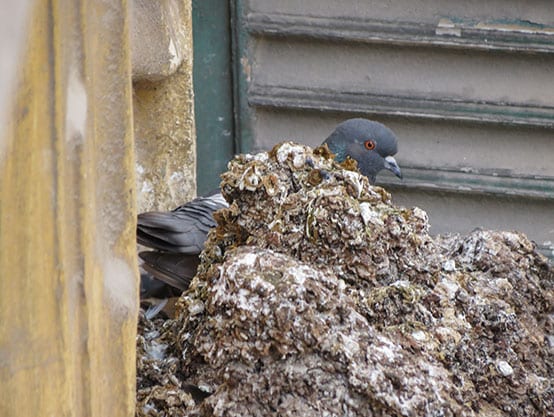
by Pigeon Patrol | May 31, 2021 | 4-S Gel Bird repellent, Animal Deterrent Products, Bird Deterrent Products, Bird Law, Pigeons, Raccoons, Sparrows, UltraSonic Bird Control
There’s been a few charges laid around town but there is one individual who is causing more headaches than normal
The pigeon problem in Kirkland Lake is so bad, police felt the need to issue a news release this morning warning residents to follow the law when dealing with them.
The town started renting out traps to residents today to capture pigeons, and police say that trappers will be responsible for the disposal of the birds, which includes a ban on throwing them in the garbage for curbside pickup. Successful trappers will instead have to take the pigeons for burial at the town dump.
“The OPP want to inform the residents that it is each individual’s responsibility to educate themselves on this topic and to ensure that they are acting within the laws, regulations and town by-laws,” says Constable Adam Gauthier.
The problem started, says Ashley Bilodeau, Kirkland Lake’s Manager of Planning and Land Development, when a few bird lovers started feeding the pigeons.
“We have a couple of residents that have been obnoxiously feeding pigeons to the point where we have some serious problem areas, so we passed a no-feeding bylaw back in the fall,” she told BayToday. “However, there is one individual who just continues to feed them despite the bylaw and has been charged. There’s been a few charges laid around town but there is one individual who is causing more headaches than normal.”
The fine for feeding is steep at $100, and that’s down from the $250 the town wanted to charge but the province wouldn’t allow it.
“So we’re trying to find different ways to combat the issue because it’s now causing problems to people’s properties and vehicles because there are so many of them.”
Bilodeau says the town has checked with the MNRF and it’s not illegal to kill pigeons although you are required to have a small game licence in order to trap and kill pigeons.
The town has not placed a limit on the number of pigeons people can capture, but police warn folks can’t use their guns to shoot the birds because discharging a firearm is prohibited within the Town of Kirkland Lake,
Bilodeau says poop is the problem.
“They’re also causing damage to buildings by trying to build nesting areas,” she adds. “We’ve got four traps here and people can come in and put in a deposit and take the trap for 10 days, and when they bring it back they get their money back.”
Pigeons were originally bred from the wild rock dove, which naturally inhabits sea-cliffs and mountains according to Wikipedia, so the bird finds the ledges of buildings to be a substitute for sea cliffs.
They have become abundant in towns and cities throughout the world. Due to their abilities to create large amounts of excrement and to carry disease, combined with crop and property damage, pigeons are largely considered a nuisance with steps being taken in many municipalities to lower their numbers or completely eradicate them.
Source
Pigeon Patrol Products & Services is the leading manufacturer and distributor of bird deterrent (control) products in Canada. Pigeon Patrol products have solved pest bird problems in industrial, commercial, and residential settings since 2000, by using safe and humane bird deterrents with only bird and animal friendly solutions. At Pigeon Patrol, we manufacture and offer a variety of bird deterrents, ranging from Ultra-flex Bird Spikes with UV protection, Bird Netting, 4-S Bird Gel and the best Ultrasonic and audible sound devices on the market today.
Voted Best Canadian wholesaler for Bird Deterrent products ten years in a row.
Contact us at 1- 877– 4– NO-BIRD, (604) 585-9279 or visit our website at www.pigeonpatrol.ca
Pigeon/Pigeon Patrol / Pigeons Roosting / Vancouver Pigeon Control /Bird Spikes / Bird Control / Bird Deterrent / Pigeon Deterrent? Surrey Pigeon Control / Pest /Seagull deterrent / Vancouver Pigeon Blog / Birds Inside Home / Pigeons in the cities / Ice Pigeons/ What to do about pigeons/ sparrows , Damage by Sparrows, How To Keep Raccoons Away, Why Are Raccoons Considered Pests/ De-fence / Pigeon Nesting/ Bird Droppings / Pigeon Dropping/ woodpecker control/ Professional Bird Control Company/ Keep The Birds Away/ Birds/rats/ seagull/pigeon/woodpecker/ dove/sparrow/pidgeon control/pidgeon problem/ pidgeon control/flying rats/ pigeon Problems/ bird netting/bird gel/bird spray/bird nails/ bird guard
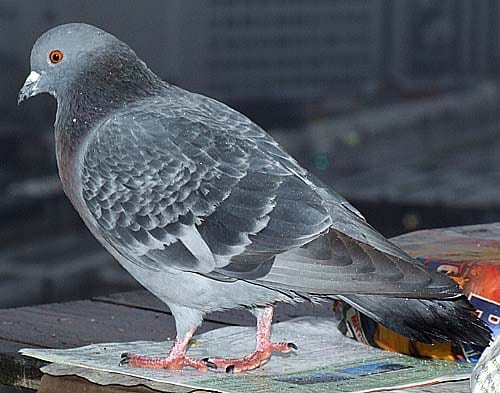
by Pigeon Patrol | May 3, 2021 | Animal Deterrent Products, Bird Deterrent Products, Bird Netting, Bird Spikes, history of pigeons, Pigeon Control, Pigeon Patrol's Services, Pigeon Spikes
Need pigeon removal in your hometown?
Pigeons are a determined bird, doggedly living near humans because of the ample food supply. These birds are indiscriminate eliminators of waste, leaving liquid splatters of dropping anywhere they travel. Their lack of concern for cleanliness extends into their everyday activities, and water contamination has been traced back to pigeon carcasses and feces in water towers near roosting sites. The waste from these birds, which are most commonly seen in urban areas, is very corrosive. Concrete, limestone and metal all suffer from the ill-effects of pigeon droppings. In cities, constant cleanup alone costs thousands of dollars.
Because of the homing ability of pigeons, there are difficulties with relocation. This species of bird was once used as a messenger between civilizations, finding their way over hundreds and thousands of miles. The only way to get rid of pigeons is to discourage them and prevent them from frequenting undesired locations. There are a number of ways to accomplish this, some proven to show more success than others. Information about pigeon trapping – analysis and methods for how to trap.
Unsuccessful methods of pigeon control deal mostly with predator fear. Plastic owls are a favorite of the public when, in reality, the fake predator appears as just that—fake. A pigeon will not be any more leery of an unmoving owl than it would an unmoving human. Pigeons are largely unaffected by unpleasant smells, though it has recently been proven that their homing ability is based on scent mapping and not electromagnetic fields. Sounds are another flop when it comes to pigeon control. Ultrasonic sound emitters may very well produce noises humans can’t hear, but rarely are those sounds ‘annoying’ to birds. If a pigeon can put up with all the noise congestion in a busy city, some random sounds from an ultrasonic radio aren’t going to bother it.
The most practical ways to get rid of pigeons is to convince them that they do not or cannot stay near your home or business. Any ledge can be a roosting site. By installing pigeon nets, bird spikes or electric shockers, pigeons will be less inclined to settle on those surfaces. Nets and spikes prevent roosting all together. Electric strips may be difficult to install at higher locations, but many brands offer solar power and require little maintenance. Electric strips do require more attention than netting and are often more expensive. If your building has smaller sections of roof, bird “spiders” are useful instruments. The wire device resembles a sprinkler in design with thin lines of arced metal extending outward from a central location. These wires are loose and are not strong enough to support the weight of a bird.
Information about how to keep pigeons away – prevention techniques.
There is something to be said for determination, too. Even though most scare tactics do not work on pigeons, harassment techniques can prove beneficial if done frequently and without fail. If pigeons have taken over your yard, letting your dog out will chase them away. Yes, they will come back when the dog is gone, but if this scenario is repeated often enough the pigeons will learn that your yard is not the easiest place to visit. When it comes to opportunistic birds, life is all about easy.
Some towns and cities have experimented with employing the use of falcons to control pigeon populations. The benefit to using birds of prey is that they often keep the pigeons moving, preventing any one roosting area to become long-term. Unfortunately, falcons cannot eliminate a large enough number of the nuisance birds to make a noticeable difference without becoming a nuisance bird themselves.
Pigeons are products of their environment. If they were not deliberately fed in parks and on streets a decline in their nuisance behaviors would be seen. These birds can live on naturally occurring food sources. Unfortunately, it is the poor sanitation habits of people that keep these animals desiring our leftovers. If pigeons have overrun your home, be sure that all garbage and compost is carefully disposed of. You may not be able to control the habits of the neighbors on your block, but you can make your house that much more uninviting by following good hygiene habits.
Pigeon Information & Facts
Pigeon Appearance: Pigeons are robust birds with short necks, usually gray in color with a faint iridescence to their feathers. They have a characteristic back and forth rhythm to their head. This bobbing is a mechanism that allows the birds to focus their vision and perceive depth. Pigeons have duplicate black bands on each wing, but the coloration on the main part of the body can vary. Their feet are suited for perching on ledges and high peaks. The beak of the pigeon is medium in both length and width, ideal for pulling apart bread, picking up small food pieces, or fishing spiders out of cracks.
Pigeon Habitat and Behavior: Pigeons are most often seen in cities. This habitat preference is largely due to the surplus of food available and the high roosting opportunities. Pigeons are fond of the water towers on tall buildings, often building messy nests on the rim. For this reason, most cities require water towers be completely sealed to prevent the birds or their waste from contaminating the water supply. A pigeon will nest almost anywhere and will often do so with many others of its kind. A roost can be made atop any vertical surface. Pigeons are known in invade gutters, ducts, air conditioners, attics, warehouses, and drains. They are not overly concerned with sanitary conditions and will utilize any vertical object in any location for their purposes.
Pigeons are also very food-driven. This problem has been made serious by the continued, deliberate feeding of the birds in urban areas. The birds have little fear of humans and will often converge around people in parks and near restaurants. Pigeon feeding is a common hobby of many city-goers, yet another reason for the lack of caution around humans.
Egg laying can take place as often as every other month. Courtship between the male and the female is brief, and the resulting egg clutch usually only contains two eggs. An abundance of pigeons will result in quick overpopulation, regardless of how many eggs are laid per pair. Some cites have sought population control by replacing viable eggs with fake or unfertilized eggs. This tactic may be effective short-term, but pigeons will lay another clutch once the original appears unproductive.
Pigeon Diet: Pigeons will scavenge for almost any type of grain-based food source. The habit of city restaurants discarding stale bread into parks increases the role this type of food plays in the pigeon diet. In nature, the birds eat insects, berries, seeds, grains, and spiders.
Pigeon Nuisance Concerns: Pigeons are not as bold as some species of birds adapted to living off human leftovers. The major concern when it comes to this species centers on its roosting habits. Pigeons most often roost in number. They are not a sanitary bird, often eliminating waste in their own nests, and living on top of the bodies of their own kind. Pigeon waste is caustic and will do permanent damage to stone and concrete. In many cities, water contamination due to pigeons and their droppings has been a major concern. Because these birds pool around areas with a high opportunity for food (such as restaurants), there is a logical concern for public health.
Pigeon Diseases: The most common zoonotic disease associated with pigeons is called histoplasmosis. This disease is caused by a fungal infection facilitated by the dried powder of pigeon feces. People with compromised immune systems should also be wary of cryptococcosis, another fungal infection affecting only those without healthy defenses. Psittacosis, more commonly transmitted by exotic birds, has been reported in larger cities. These illnesses present with flu-like symptoms, making diagnosis and treatment difficult unless the disease is well underway.
This site is intended to provide pigeon education and information, so that you can make an informed decision if you need to deal with a pigeon problem. This site provides many pigeon control articles and strategies, if you wish to attempt to solve the problem yourself. If you are unable to do so, which is likely with many cases of pigeon removal, please go to the home page and click the USA map, where I have wildlife removal experts listed in over 500 cites and towns, who can properly help you with your nuisance pigeon.
Pigeon Patrol Products & Services is the leading manufacturer and distributor of bird deterrent (control) products in Canada. Pigeon Patrol products have solved pest bird problems in industrial, commercial, and residential settings since 2000, by using safe and humane bird deterrents with only bird and animal friendly solutions. At Pigeon Patrol, we manufacture and offer a variety of bird deterrents, ranging from Ultra-flex Bird Spikes with UV protection, Bird Netting, 4-S Bird Gel and the best Ultrasonic and audible sound devices on the market today.
Voted Best Canadian wholesaler for Bird Deterrent products ten years in a row.
Contact us at 1- 877– 4– NO-BIRD, (604) 585-9279 or visit our website at www.pigeonpatrol.ca
Pigeon/Pigeon Patrol / Pigeons Roosting / Vancouver Pigeon Control /Bird Spikes / Bird Control / Bird Deterrent / Pigeon Deterrent? Surrey Pigeon Control / Pest /Seagull deterrent / Vancouver Pigeon Blog / Birds Inside Home / Pigeons in the cities / Ice Pigeons/ What to do about pigeons/ sparrows , Damage by Sparrows, How To Keep Raccoons Away, Why Are Raccoons Considered Pests/ De-fence / Pigeon Nesting/ Bird Droppings / Pigeon Dropping/ woodpecker control/ Professional Bird Control Company/ Keep The Birds Away/ Birds/rats/ seagull/pigeon/woodpecker/ dove/sparrow/pidgeon control/pidgeon problem/ pidgeon control/flying rats/ pigeon Problems/ bird netting/bird gel/bird spray/bird nails/ bird guard
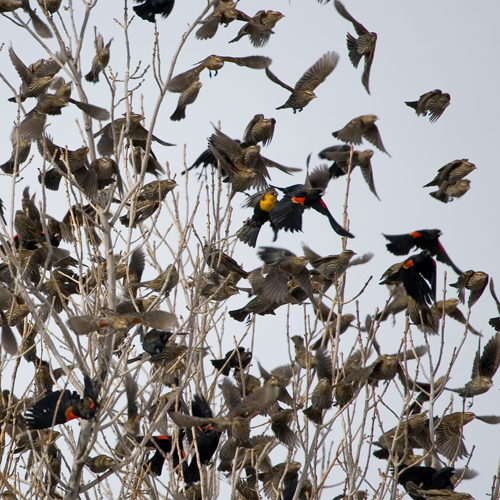
by Pigeon Patrol | Feb 9, 2021 | Animal Deterrent Products, Bird Deterrent Products, Bird Law, Bird Netting, Bird Spike, Bird Spikes, Pigeons, Raccoons
What Bird Are Considered To Be A Pest?
Pest Bird
The Canada goose, pigeons, starlings, seagulls and house sparrows are the most common pest birds in our area. Pest birds are responsible for millions of dollars of damage every year. Bird droppings are highly caustic and eat away at roofing and other structural material. They contaminate food, water, and anything they touch. They release airborne spores that can be inhaled by customers, workers and family members. They also carry disease-causing parasites, fleas, ticks, mites, lice and other biting insects.
Are They Dangerous
Pigeon’s droppings and nests are of medical concern because they have over 50 diseases associated with them. Some of these include histoplasmosis, chlamyiosis, and salmonella. Their droppings are also acidic and may mar many different surfaces. The Canada goose is aggressive at protecting its territory and airport safety is jeopardized as many airport bird strike collisions result from geese roosting in open areas near airports. House sparrows and starlings can be a major nuisance in urban areas due to their nesting, eating, and living habits. Gutters and drainage pipes clogged with sparrow or starling nests can back up and cause extensive water damage. Furthermore, numerous fires have been attributed to electrical shorts from machinery housing sparrow or starling nests.
How To Get Rid Of Them
Controlling these birds can be difficult. That’s why our services may include a combination of products and techniques. Corrective landscaping, barriers, and exclusion methods may all be used to rid your home or business of these nuisance birds. source
Can You DIY?
Due to the complexity of treatment and the time required, pigeons, Canada geese, and house sparrows are generally not a pest many people have success in eradicating on their own. Beware when purchasing products online, as many are not effective. Pesticides are not typically effective against birds and can be harmful to people and pets if they are misused or mixed improperly.
How Soon Can We Come?
Our customers are our top priority. The Pigeon Patrol team will help you as soon as we can
Are These Treatments Safe?
Pigeon Patrol uses the least amount of materials possible while still resolving the problem. We utilize natural products, baits, and mechanical means as a form of treatment whenever possible keeping you, your family, employees, and customers safe.
How To Prevent For The Future
Pest bird problems can be difficult to prevent. Many of our clients choose year-round service against pest birds for the protection of their home or business.
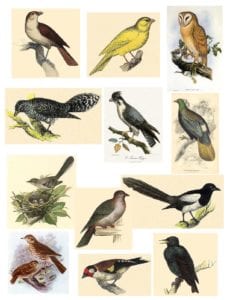
Pigeon Patrol Products & Services is the leading manufacturer and distributor of bird deterrent (control) products in Canada. Pigeon Patrol products have solved pest bird problems in industrial, commercial, and residential settings since 2000, by using safe and humane bird deterrents with only bird and animal friendly solutions. At Pigeon Patrol, we manufacture and offer a variety of bird deterrents, ranging from Ultra-flex Bird Spikes with UV protection, Bird Netting, 4-S Gel and the best Ultrasonic and audible sound devices on the market today.
Contact us at 1- 877– 4– NO-BIRD, (604) 585-9279 or visit our website at www.pigeonpatrol.ca
Pigeon / Pigeon Patrol / Pigeons Roosting / Vancouver Pigeon Patrol / Bird Control / Surrey Pigeon Control / Pest / Vancouver Pigeon Blog / Birds Inside Home / Pigeons in the cities / Ice Pigeons/ What to do about pigeons/ most common types of sparrows , Damages Caused by Sparrows, How To Keep Raccoons Away, Why Are Raccoons Considered Pests?de-fence, Pigeon Nesting and Breeding Patterns and Behavior What Do I Do With a Bird Trapped in My Wall? Professional Bird Control Company Keep The Birds Away From Your Business Why Are Raccoons Considered Pests?
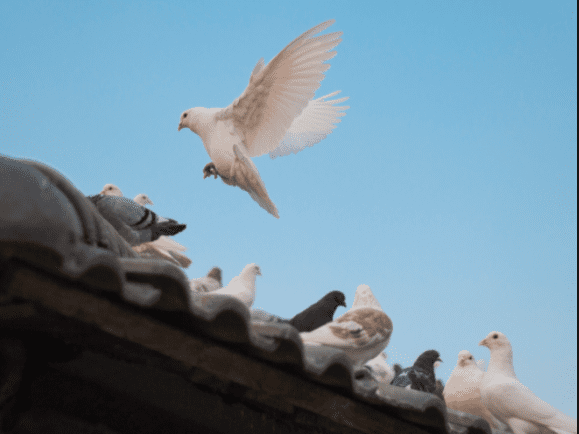
by Pigeon Patrol | Feb 9, 2021 | Animal Deterrent Products, Bird Deterrent Products, Bird Law, Bird Netting, Bird Spike, Bird Spikes, Pigeon Patrol's Services, Pigeon Spikes, Pigeons, UltraSonic Bird Control
Bird control technicians’ nightmare – what to do when we are asked to do the impossible? The straight answer is that there is really nothing we can do when pigeons land on your roof, but there is much more to know.
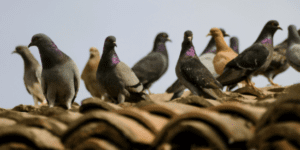
Many customers ask: “Why? Why my roof, what’s so special about my roof that they have to land there?” Believe it or not you are asking the right question: Why? Once you understand why, you will also understand why is it hard to provide a solution in this situation.
Almost always, the primary cause of such problem is the availability of food nearby, plenty of it on a regular basis. Probably someone is feeding the birds or there are lots of garbage in the area or open garbage bins/containers. They could also nest or roost in close proximity and simply they use your roof as a comfy perching spot having a nice vantage point over their feeding area.
What could we do? Install hundreds of feet of spikes on your roof? Put up scary owls? Maybe speakers on the roof peak? Unfortunately none of them are viable. It is simply not feasible to protect large, flat (horizontal or sloped) roof surfaces, such as the entire roof of a victorian house for example.
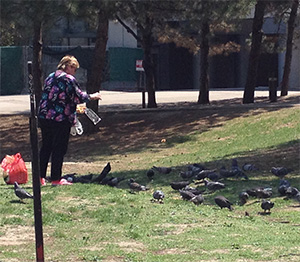
Lady feeding the pigeons in College Park – every day.
First, we need to find ways of eliminating food and water sources nearby. Then we must find their nesting/roosting areas – which will most likely be on another property, otherwise you would see them somewhere else on your house/building, (in which case it would be very easy to resolve the issue,– that provides sheltered structural configurations to establish a protected area where they can stay at night. Pigeons don’t see well at night and usually they go to their roosting spots before nightfall and stay there during the night.
If protecting these areas are not possible (because they are on someone else’s property) we can look at strategically installing Bird Spikes or exclusion Bird Netting or the combination of both, maybe Electric Tracks at critical areas to discourage them from landing on your roof.
You can see now that there aren’t any straightforward solutions in the case of house roof tops and that it is very time consuming to address the issue holistically. The best thing you can do is to call up a professional and get an opinion, you might have missed something that a pro will notice that could help resolve the issue.
source
Some other options for bird repellent would be the Ultrasonic Sound Repellent which makes noises that can only be heard by pigeons and scare them off with the sound or the laser beam which can be activated by movement or you can time when these lasers come on. These lasers are too strong for the pigeons vision to handle and they will fly elsewhere. You can purchase these here : https://www.pigeonpatrol.ca/product/laser/
Pigeon Patrol Products & Services is the leading manufacturer and distributor of bird deterrent (control) products in Canada. Pigeon Patrol products have solved pest bird problems in industrial, commercial, and residential settings since 2000, by using safe and humane bird deterrents with only bird and animal friendly solutions. At Pigeon Patrol, we manufacture and offer a variety of bird deterrents, ranging from Ultra-flex Bird Spikes with UV protection, Bird Netting, 4-S Gel and the best Ultrasonic and audible sound devices on the market today.
Contact us at 1- 877– 4– NO-BIRD, (604) 585-9279 or visit our website at www.pigeonpatrol.ca
Pigeon / Pigeon Patrol / Pigeons Roosting / Vancouver Pigeon Patrol / Bird Control / Surrey Pigeon Control / Pest /








